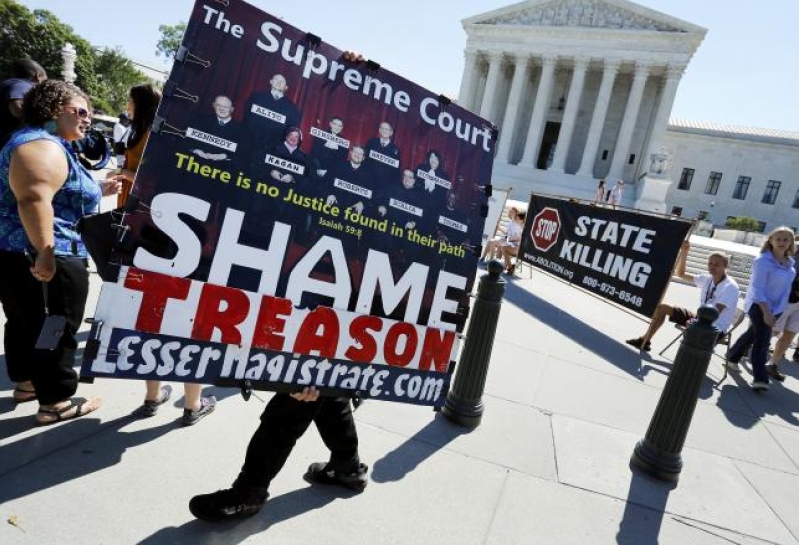
A Texas attorney general has declared that state workers can refuse to issue marriage licenses to same-sex couples if they cited 'religious objections' in not completing the task. He made those comments shortly after the Supreme Court ruled 5-4 in favor of legalizing same-sex marriage on Friday.
According to a report from KVUE-TV, Texas Attorney General Ken Paxton issued a statement on Sunday declaring that state workers do not have to issue marriage licenses to same-sex couples if the action was against their religious beliefs.
"(Judges and other state workers) may claim that the government cannot force them to conduct same-sex wedding ceremonies over their religious objections," Paxton wrote.
Paxton warned that any state employee who decides not to issue same-sex marriage licenses due to religious beliefs could "face litigation and/or a fine." However, he promised to stand up for their rights.
"Numerous lawyers stand ready to assist clerks defending their religious beliefs, in many cases on a pro-bono basis, and I will do everything I can from this office to be a public voice for those standing in defense of their rights," Paxton wrote.
Paxton contended that the Supreme Court case, known as Obergefell v. Hodges, "ignored the text and spirit of the Constitution to manufacture a right that simply does not exist."
"The Court weakened itself and weakened the rule of law, but did nothing to weaken our resolve to protect religious liberty and return to democratic self-government in the face of judicial activists attempting to tell us how to live," Paxton wrote.
Paxton argued that the high court made a "lawless ruling" on same-sex marriage that has created a "fundamental dilemma" in Texas.
"A ruling by the U.S. Supreme Court is considered the law of the land, but a judge-made edict that is not based in the law or the Constitution diminishes faith in our system of government and the rule of law," Paxton wrote.
However, KVUE pointed out that state Sen. Jose Rodriguez disagreed with the attorney general's statement, contending that the legal advice was on shaky ground.
"The Attorney General has crossed the line in advising local public officials, who are not his clients, that they are not bound by the U.S. Constitution," Rodriguez said. "He has erred grievously in giving them unsolicited advice that may subject them to liability in both their individual and official capacity, and could result in their removal from office for failure to uphold the law."
According to KVUE, the American Civil Liberties Union also objected to Paxton's statement.
"Religious liberty is a fundamental right protected by the First Amendment, but that doesn't mean that government officials can use their personal religious beliefs to avoid following the law regarding marriage," Rebecca Robertson of the ACLU of Texas wrote in a statement. "Government officials who take an oath to uphold the law are required to treat all Texans equally, regardless of who they are or whom they love."
Even though he thought the high court's majority opinion was "flawed," Paxton noted that the Supreme Court acknowledged that "religious liberty protections" existed in their ruling.
"Our religious liberties find protection in state and federal constitutions and statutes," Paxton wrote. "While they are indisputably our first freedom, we should not let them be our last."







